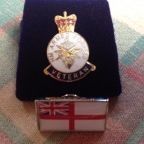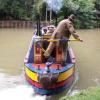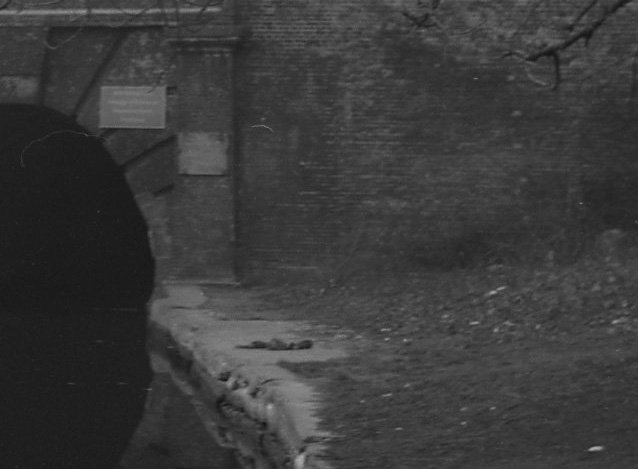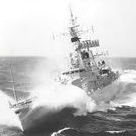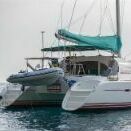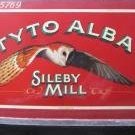Leaderboard
Popular Content
Showing content with the highest reputation on 16/10/17 in all areas
-
I was the person the BBC contacted and asked to talk about the "boat graveyard" at Harefield. I took the view that all publicity is good publicity, and it was great that the Beeb felt there was an appetite for a canal history programme. Prime time on the BBC is a great spot for viewer numbers but its not the time when an in depth programme would get aired. The coverage by Gogglebox was probably the level Sat Night TV is aimed at http://www.channel4.com/programmes/gogglebox/on-demand/.... The BBC team doing the research and recording were genuinely really interested in the site and whole local story - from the first "Bricks by Boat"chapter (as featured in the latest Narrowboat mag), to the final chapter and the boats sinking in the Colne Valley gravel pits. I was supposed to be advising the crew behind the camera, so rocked up unshaven and in scruffy togs. I ended up being interviewed by Mary Ann Ochota in front of the camera, so all a bit impromptu... Having to say the same thing over and over as they filmed from different angles wasn't the easiest thing for my brain to cope with! Anyway, the main thing from my perspective is that the Harefield filming "made the cut", and so got some great airtime. The BBC were genuinely interested in the site and the story, and I spent a nice amount of time with Mary Ann, showing her other boat remnants off camera too. So, we have gained some good allies and the possibility of expanding on the story in the future.2 points
-
Actually, there were some real experts who were consulted for the programme - Barry Argent and Laurence Hogg, especially. I was asked if I'd like to talk about FMC on camera, but I knew every mistake or slip of the tongue I made, however small, would be pounced by the forum. So I declined2 points
-
2 points
-
2 points
-
This post cannot be displayed because it is in a forum which requires at least 10 posts to view.
-
Holy grail?? Why on earth would you want a vintage engine without the engine room that goes with it? Is this your first boat by any chance...?1 point
-
Absolutely do not fit those wheels Dave. Terrible idea. Personally I love tunnels. Just calculated I have transited over 50 miles and spent over 16 hours in tunnels in the past two years. Not a scratch on the handrails. Judging by the quality of that photo in the first post what the OP actually needs is something to steady his hand on the tiller. 14 pints of lager is a medically proven remedy. JP1 point
-
Is this any help? https://www.amazon.co.uk/s/ref=nb_sb_ss_c_2_19?url=search-alias%3Dstripbooks&field-keywords=phillips+navigator+road+atlas+2018&sprefix=phillips+navigator+%2Caps%2C197&crid=3L3SU08Z2YXXS1 point
-
We 'invested' in a copy of that map a couple of years ago so Margaret could direct emergency services to where we are. Just in case I get a taste of a local brew and inadvertently go for a swim on my way home. (I made the last bit up for dramatic effect). Hopefully the emergency services have their own copy.1 point
-
It was definitely Phillips, showed all the bridges. ours is Phillip's Navigator Britain ISBN 0-540-08276-7 but its a bit old now1 point
-
I commented in a previous thread that we need someone on here with recent experience in the fuels blending industry. I worked on one of the UKs biggestest refinery/Chemical plants - at one stage installing an on line cetane measurement device but I left in 2005 and my knowledge of current practices is now zero. This corresponded with the introduction of ULS diesel (ultra low sulphur). Prior to 2005, we made Gas Oil and it was pumped into tankers with or without red dye and sold to the market - both to road fuels and heating fuels. All within the specs required. Materials were blended into tanks and those tanks sold to the market where specs could be achieved. Yes, it was often the same stuff. In 2005 (ish) ULS diesel came in and the materials used to make the diesel changed - ie the product from the hydrocracker was now very valuable and an important part of the blending process. Blending strategies therefore changed and there may have been a split in the 2 products (road fuel and heating oil). However it is interesting to do a bit of a search. Have a look at this site (typical of others). http://www.fueloils.co.uk/commercial-fuel/commercialfuels/gasoil They sell ULS diesel as road fuel and gas oil to the heating market - 2 different products. Read what they say on this link. It seems it is the gas oil that is going to marine applications. They dont put red dye in their ULS diesel. If you go to the 'downloads' tab, you can see the specs they are making to - for the ULS and the gas oil. There is not a lot of difference although the ULS is likely to have a higher cetane number but not guarunteed. Note that both products have a 7% limit on Bio diesel content. To answer Neil2 above, there are limits on how much bio can be use in heating fuel as it affects seals and the plastic storeage tanks. If they supply marinas in kent, it will be with red diesel ie gas oil. I wonder how many other local diesel suppliers are workin the same way as this link. It seems the efficient way to do it - ie only 2 tanks needed, one red, one white. It would be very costly to have a red ULS diesel tank. Having worked in the industry and knowing how they blend road fuels (diesel and gasoline) I am not worried at all about using gas oil in a diesel engine (For a boat) as it meets the minimum fuel specs. I do have a concern though about 'bad' batches - as these do occur. A refinery's objective is to get as much of the 'rubbish' in the barrel of oil into the road fuel and if it can do this within spec then it will. It is quite possible that a batch of gas oil could have something added that makes combustion more difficult but is still in spec. In the OP's case, I think it unlikely that such a bad reaction is down to a bad batch (and unlikely to be linked to cetane number). Edit - cuthound beat me to it - 7% max bio1 point
-
If the diesel is made to EN590, (as far as i am aware all commercially sold diesel is) then it has a maximum FAME (bio) content of 7%.1 point
-
1 point
-
It doesn't realy matter does it as most boats on the K and A stay there for life anyway so the lock is only needed to let a few purple boats through each year anyway.1 point
-
Just like a modern version of the day visits to Bedlam to see the mad folk chained to the walls1 point
-
This post cannot be displayed because it is in a forum which requires at least 10 posts to view.
-
Right that makes some sense but the typical marine exhaust manifold has a water jacket that used to serve (and still does on heat exchanger boats) as the header tank. To this end a pressure cap was used on the manifold. If you have a remote tank then either you need a higher pressure cap on the manifold, and with very good seals, so the cap[ on the expansion tank is lifted first. If the expansion tank is connected to the manifold filler neck by a thinish hose then the cap[ on the manifold must have a rubber seal under the cap itself, not just where the pressure valve seats. An ordinary pressure cap will not make a good seal so coolant will be blown out of the manifold cap. In this case as long as there is an pressure cap on the remote expansion tank you do not need a pressure cap on the manifold, just a cap to seal at the top of the manifold filler neck. Coolant leaking from the manifold filler cap will usually end up in the engine drip tray. Air trapped in the system will expand a lot more than the coolant so something wrong with the manifold filler would allow coolant to leak out there. Once you are sure the leak is not coming from the manifold filler the next thing to do is to get up close and personal a hot running engine using torch and mirror to inspect the whole lot for leaks although they may be difficult to spot when hot so I would tend to try to use a cooling system pressure tester on a cold, stationary engine. Take special care to inspect the front of the engine below the water pump pulley. Old water pumps can leak and seal at various times in the engine running cycle. Look for water drips, water stains or antifreeze stains down the front of the engine. Horribly inconsistent things once they start to leak. Then there are the core plugs to inspect on the engine.1 point
-
This post cannot be displayed because it is in a forum which requires at least 10 posts to view.
-
In the great CWDF tradition of taking off at a tangent.. I think on balance I would rather have an outboard on a small boat. We've cruised extensively on a little Springer with an o/b and I don't remember obtaining fuel being an issue and we didn't have internet access. It's surprising (or is it?) how many filling stations are either adjacent or very close to the canal. Hanging the engine off the back frees up a lot of room in the cabin, and removes one source of water entering the bilge. The electricity generating issue isn't a big deal now we have cheap solar and LED lighting. The main disadvantage I would say is wheel steering an outboard is the worst of all combinations and it's no surprise you see a lot of outboard powered boats where the owner has fitted a rudder and locked the engine in place. Our Springer had a tiller on the outboard though and was great fun to steer. Oh, and it consumed about a litre an hour.1 point
-
I am very happy with both the disadvantages and advantages of my outboard, We live aboard for a month at a time during the summer months and have no problems with getting fuel or electricity, and we do not have to run our engine for hours when we are stationary. It's just a different way of doing it1 point
-
I wouldn't argue with any of that; just sharing my experience of the amount of trouble actually involved in using petrol. The point about electricity is important, of course. Our old boat had a manual shower pump and a coolbox instead of a fridge, but we managed without a generator for holiday-style cruising. During a day's cruising, the alternator (and a small 25W solar panel) sufficed to put enough power into the domestic battery to run the LED lights and water pump, as well as charging up gadgets including a portable DVD player for use in the evening. Obviously we could have been a bit less frugal with power if we'd had a bigger solar array and battery bank. I'm the first to recognise the limitations of a petrol outboard and am very glad our new boat has a diesel inboard, but I'm just trying to provide the OP (who may not have the option of buying a diesel-inboard boat) with a bit of reassurance about the viability of the petrol-outboard option.1 point
-
Good to hear how successful the overplate has been. My boat is booked in with Martin for exactly the same work, early next year.1 point
-
If its dangling with no stove under it, be careful, if it suddenly drops, they don't half drop with a thump, and can damage hearths, floor. Put a pile of cushions or something beneath it. Go easy waggling it and banging, cast iron collars can crack quite easily. Just chip away calmly and easy. You could pour a drop of vinegar down around it, might help. A good plan also is to stick a long pole down through it so that when it does let go it won't fall over and bust things inside the boat.1 point
-
I don't think that the comment implied petrol is not available, just that, unlike diesel which can be obtained within a matter of few feet of the canal, and having a big tank you only have to worry about filling up once a month (or less frequently), with petrol you need to plan to stop (almost) every day, walk a mile or two to find a petrol station, walk a mile or two back to the boat and repeat, repeat, repeat. If you have (say) 2x 5 litre cans then you are going to be carrying them to a petrol station after every 8-10 hours cruising Being limited by law as to the amount of fuel you can carry on board (30litres), and limited, by law, to the amount you can buy in cans, the increased fire risks and BSS requirements just makes petrol an "inconvenient" fuel. The other serious problem with an outboard is the lack of electrical generation (small alternator - typically 6 or 7 amps), they are designed to top-up a starter battery and will not successfully charge a domestic battery bank. Unless you are very, very light uses of power you may find you need a generator and battery charger to keep on top of your domestic electricity usage. - more petrol needed.1 point
-
The worrying thing is that I think that you actually believe what you write. You actually believe that if you try to prove that Peel cannot charge, some charitable trust will take over, and that funders will be falling over themselves to pour cash into the Bridgewater Canal to enable all and sundry to use it without charge. Just as happened when BW canals went to a charity, and we all got free licences on the former BW canals.1 point
-
1 point
-
Are you trying to tell me it is not just a tank full of water with a hose at the top and another at the bottom?1 point
-
Just get a Speedfit 22mm to 3/4 hose tail connector https://www.ebay.co.uk/i/263097794468?chn=ps&dispItem=1&adgroupid=46979492363&rlsatarget=pla-370283920966&abcId=1128936&adtype=pla&merchantid=113696220&poi=&googleloc=9046833&device=t&campaignid=856333651&crdt=0&ul_ref=http%3A%2F%2Frover.ebay.com%2Frover%2F1%2F710-134428-41853-0%2F2%3Fmpre%3Dhttps%253A%252F%252Fwww.ebay.co.uk%252Fi%252F263097794468%253Fchn%253Dps%2526dispItem%253D1%26itemid%3D263097794468%26targetid%3D370283920966%26device%3Dt%26adtype%3Dpla%26googleloc%3D9046833%26poi%3D%26campaignid%3D856333651%26adgroupid%3D46979492363%26rlsatarget%3Dpla-370283920966%26abcId%3D1128936%26merchantid%3D113696220%26gclid%3DCjwKCAjwjozPBRAqEiwA6xTOYOslble-PHDp5mhVTRxClbEAATNVhUOy3ymTcmG-9LhbSSLu_wgKVhoCTiAQAvD_BwE%26srcrot%3D710-134428-41853-0%26rvr_id%3D1336842226153 easy peasy!1 point
-
I don't quite see it it that way. All the OP has sought according to his postings, has been clarification of what the legal position truly is, and has objected fiercely to the public relying on mere say-so from the authority. Admittedly, in the absence of clear direction from their legal department, he has been somewhat precipitate and disproportionate in his visceral response to their obfuscation, but it takes people with passion for justice and with conviction to force things into the open - and whether the result is what one might have desired or not, it is desirable to achieve a result. Nearly 2 and a half centuries of applicable legislation containing several different private company Acts as well as relevant public Acts to sort through, and their own lawyers cannot come up with a straightforward answer to a simple yet cogent question as to why they do what they do? It brings to mind the comment by Hildyard J regarding the 'morass' of BW legislation - it cannot be right that the public should have to rely on BW's say-so as to what they are entitled to do. Same applies here.1 point
-
Yes, and all credit it to you for having the enthusiasm to omit the emoji from my quote.1 point
-
1 point
-
Try going through tunnels at a normal cruising speed - it is easier steer at a decent speed. It also helps to have your tunnel light pointing up towards the roof and to the starboard side of the boat - yoy don't blind the steerers of boats coming in the opposite direction. I also like to have a second light at the rear of the boat - you can then still see the low bits when your headlight has gone past them - this is really helpful in tunnels like Harecastle which have changing profiles. Finally if you think you might damage your cratch cover take it off before entering tunnels.1 point
-
Well I ought not to have spent the time, but herewith my own hasty synopsis of the relevant Acts affecting PRN & pleasure boat charges on the Bridgewater Canal. Question marks denote legislation I do not have copies of. 1759 Bridgewater Canal Act s.29 - 2 interpretations possible respecting PRN: no mention of pleasure boats, but ambiguity could potentially support use of any boat at all. 1760 Bridgewater Canal Act ? 1762 Bridgewater Canal Act ? 1766 Bridgewater Canal Act Riparian owner/occupiers to have free use of pleasure boats without charge, so long as no lock passage without consent. Note: if riparians granted free use of pleasure boats, implication is that others have not been; but see erivers post re GJCC Act 1793 [& my response] 1794 Bridgewater Canal Act s.73 Riparian boats may pass locks if either: a) consent of company, or b ) pay tonnage equal to 6 tons. Note: combining this section with previous, would suggest that ‘consent’ in 1766 was an ex-gratia one, and that henceforward an alternative to such consent was payment of a fixed charge. It might seem from this that even if consent for something was needed from the company, they were free to give or refuse that consent, but not on the basis of charging for that consent – perhaps. 1795 Bridgewater Canal Act ? 1847 Harbour Clauses Act ? 1870 Bridgewater Rules - nothing relevant 1885 Manchester Shipping Canal Act Interpretation: “vessels” includes “craft of every class & description however propelled.” s.62 provides that any riparian owner/occupier may construct wharves, landing places, side basins and lay-byes with suitable access to the canal, free of wharfage rates. s.128 provides that the company may demand dues in respect of every vessel specified in 3rd schedule to the Act on entering or leaving the canal [relating only to commercial craft]. s.129 provides for charges for carriage of both passengers & cargo s.130 provides that “light or empty vessels shall be at liberty to pass one way between the extreme points before mentioned or any intermediate places toll free.” s.138 provides that charges may be made for any vessel using the ‘communications’ to be built at Barton, unless repairs interrupt passage. s.139 provides that use of the canal for conveying fertiliser for field within a mile of the canal is free. s.149 provides that the company may licence lighters s.196/7 provide that the company may licence steam powered tugs for towing s.196 added byelaw powers – for regulating use of wharves, landing places, quays, basins and lay byes, but not private ones; for regulating speed limits of steam-powered vessels of all sorts; for regulating the T&C’s and charges for the grant of any licences as aforementioned; s.213 provides that unless expressly provided in this 1885 Act, nothing is to extend to prejudicially affect the provisions of the Bridgewater & etc Canal Acts Note: there are 2 classes of commercial vessel that they get power to licence here [which is later extended to other classes] but not including pleasure boats. 1886 MSC Act 1887 MSC Act 1888 MSC (additional lands) Act 1888 MSC (alteration of works) Act 1888 Railway and Canal Traffic Act - qualifies MSC under Transport Act 1962 s.52. 1890 MSC (tidal openings & etc) Act 1890 MSC Act - s.19 extension of Byelaw powers – nothing relevant 1891 MSC Act - nothing relevant 1893 MSC Act - nothing relevant 1893 Manchester Corporation (ship canal) Act - nothing relevant 1893 MSC (additional capital) Act - nothing relevant 1893 MSC (surplus lands) Act - nothing relevant 1894 MSC Act - nothing relevant 1894 Canal Rates Bridgewater & etc Act General Schedule applicable to all listed canals s.7(viii) expressly excludes charges for the boat occupation of any private wharf on the canal, in any private lay-by or in any private canal basin. Also provides for free overnight mooring at any Company berth, and for any reasonable time when not at work [providing no impediment to navigation or the facility]. Amended later in 1960. s.25 provides that “nothing in this schedule shall apply to pleasure boats or affect the tolls or charges (if any) which the Company are authorised to make in respect of such boats under the provisions of any Act of Parliament”. Note: the company were authorised by the 1794 Act to charge for pleasure boats to pass through a lock Special section Applicable Only to the Bridgewater Canals s.(i) provides that any empty boat passing through one or more locks, or entering the canal from another navigation, may be charged 5 shillings [unless on a return passage having paid toll on cargo carried Note 1: on its own, this could be interpreted as applying to any pleasure boat - which will fit the definition of an empty boat so far as carriage of cargo is concerned. The query would arise: does the special section come under the s.25 exemption of the general section? It seems to me that it must, but it is possibly arguable, demanding more attention. IF it could be said to apply to pleasure boats, then a charge for entering or leaving the canal from or to an adjoining navigation is authorised. It would not affect the freedoms of riparian boats, so long as they remained at private berths, and when leaving those to navigate did not either use a lock or leave the canal. Note 2: – on reading the 1960 Act, it is apparent that the special section did not include pleasure boats, hence the remedy of the additional clause; it DOES now include them. 1896 MSC Act - extension of byelaw powers for Bridgewater – nothing relevant 1897 MSC Act - nothing relevant 1900 MSC Act - nothing relevant 1904 (finances) Act - nothing relevant 1907 (various powers) Act - nothing relevant 1907 MSC (Bridgewater) Act – nothing relevant 1911 MSC Act - nothing relevant 1912 MSC Act - nothing relevant 1913 MSC Act - nothing relevant 1919 MSC Act - nothing relevant 1920 MSC Act - increase of Bridgewater rates; nothing relevant 1924 MSC Act - nothing relevant 1925 MSC Act - nothing relevant 1926 MSC (general powers) Act - nothing relevant 1926 MSC (staff superannuation) Act - nothing relevant 1928 MSC Act - nothing relevant 1933 MSC Act - nothing relevant 1936 MSC Act - s.32 removal of sunk stranded or abandoned vessels – not relevant 1945 MSC Act - nothing relevant 1947 Transport Act - nothing relevant 1949 MSC Act - nothing relevant 1950 MSC Act s.18 increased Bridgewater rates; s.25 abandonment of Bridgewater lock; undertakings re: other locks [repealed 1975] 1952 MSC Act - increased Bridgewater rates - no longer relevant 1954 Transport Charges &etc (miscellaneous provisions) Act – applied national charges schemes to private undertakings – nothing relevant – abolished in 1962 1956 MSC Act - ? 1960 MSC Act s.3 - application of Harbour Clauses Act 1847 – not relevant s.4 – additional canal tolls s.6 – company can charge any boat at all that remains in Runcorn Dock, and for use & occupation of any berth in Runcorn Docks s.6( b ) – extends definition of vessel in special section of the 1894 Rates Act applicable to Bridgewater, to embrace every type of craft, however propelled [hence pleasure boats]. Hence the entry & exit toll now applied to pleasure boats. s.9 – powers of removal of Bridgewater boats left therein without consent Note: consent not required for boats at private property/moorings, but is required for longer than overnight on company premises &/or towpath, for lock passage if not paid for, & for entering and exiting the canal. Schedule 3 – articles to be carried by pleasure craft in the harbour 1962 MSC Act - nothing relevant 1962 Transport Act - applies s.43(1)( b ) (2) (3) (5) & (6) to the charges of the Bridgewater 1966 MSC Act - nothing relevant 1970 MSC Revision Order - extension of byelaw powers 1975 MSC Revision Order - nothing relevant 1976 MSC (black bear canal) Act - abolished PRN, but nothing relevant to Bridgewater Note: I have not seen the original Act for the waterway affected; if couched in the same terms as the Bridgewater, might affect the interpretation of PRN there. 1983 MSC Revision Order - nothing relevant 1984 MSC Revision Order - nothing relevant 1987 MSC Revision Order - nothing relevant 1990 MSC Revision Order - nothing relevant 1992 MSC Revision Order - nothing relevant 2012 Bridgewater Canal (Transfer of Undertakings) Order s.4 - affirms existing byelaws, extends byelaw making powers to include registration, T&C’s etc, subject to a penalty not exceeding level 3 on the standard scale. s.7 – affirms power to make reasonable charges, though that subject - s.7( c ) - to any prior enactment which “expressly or impliedly provides for freedom from charges or otherwise prohibits the making of any charge.” Note: that last respecting “reasonable” is odd, given the TA 1962 which had specifically removed the need for reasonableness in charges – maybe government were having a change of heart? Apart from the missing Acts, there will be sections bearing on consent for berthing at private premises which I have skimmed over and which I don’t feel like going back to look for at the moment. So far as PRN is concerned, it is now irrelevant, given Parliamentary sanction for transit charges to be levied has been discovered.1 point
-
This post cannot be displayed because it is in a forum which requires at least 10 posts to view.
-
This post cannot be displayed because it is in a forum which requires at least 10 posts to view.
-
1 point
-
If you think those pix show pea super smog then you are mistaken. I well remember in the 50's in London being unable to see my hand in front of my face. Bus conductors would walk in front of the buses holding up burning newspaper. We had a big in and out drive and one night my dad came home from work with a whole line of cars following him up the drive My mum was not best pleased when her new net curtains turned yellow and disintegrated. The last pea super was in the early 60's ans lasted 3 days. Good old days? Nah not at all Phil1 point
-
From what I have seen the IWA are briefing a great deal against live aboard boaters, at least where it relates to the South East and particularly the London area. In doing this they purport to be speaking for other boaters who are not live aboard, of course. I'm not a full time live aboard, nor ever likely to be close to being one, but I do not find any stance that seeks to divide boaters into different camps, and hence divide them to be in any way helpful. There is plenty all boaters need to be concerned about in terms of our canals, how CRT manage them, and particularity how important CRT actually choose to make boating as part of their total remit. What is needed, in my view, is for us all to try and understand each others position, and to try wherever possible to be putting as united a front as we can to CRT, (although I realise this is often far from straightforward!). Overall I think people like the IWA leadership, (at one extreme), and the NBTA leadership, (at the other extreme), tend to be doing more harm for boaters as a whole than the good they think they are doing for the rather small percentage of all boaters that they believe they represent. I suggest the vast majority of us boat owners do not hold such extreme views, of see quite as many of our fellow boat owners as "the enemy". A lot of the unhelpful and divisive comment actually comes from a very small percentage of all boat owners.1 point
This leaderboard is set to London/GMT+01:00









